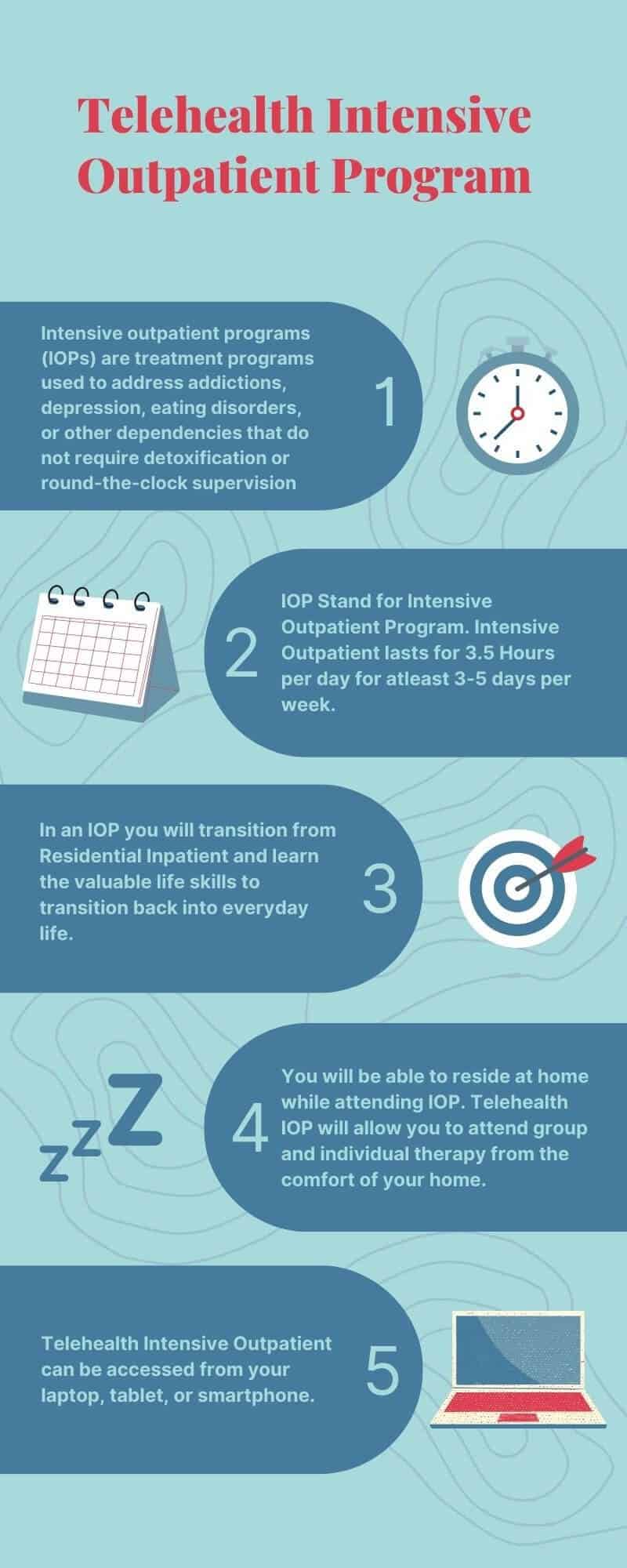Browsing the Complexities of Twin Diagnosis Therapy Within an Intensive Outpatient Program Setting
In the world of mental health and wellness and dependency treatment, the crossway of twin diagnosis provides a nuanced challenge that requires a comprehensive and tailored strategy. Within the confines of an Extensive Outpatient Program (IOP) setting, the intricacies of resolving co-occurring mental health and wellness problems and compound make use of disorders need a fragile balance of proficiency and sources to navigate. The integration of evidence-based practices, collective efforts among multidisciplinary teams, and an eager understanding of the distinct demands of each individual are necessary components in successfully managing double medical diagnosis within an IOP structure. By checking out the details of double medical diagnosis therapy within this extensive outpatient context, a clearer course arises towards alternative and lasting recovery for those grappling with these intertwined difficulties.
Twin Medical Diagnosis Summary

Recognizing dual medical diagnosis is necessary as it needs an extensive and incorporated method to treatment. By recognizing the interaction in between substance usage and mental wellness, doctor can tailor interventions to meet the distinct demands of each person. This holistic strategy not only addresses signs and symptoms however also targets hidden factors that add to the twin diagnosis.
In addition, neglected double medical diagnosis can result in a cycle of regression and worsening mental health and wellness signs and symptoms. By acknowledging the intricacy of dual medical diagnosis and providing specific treatment, health care specialists can support individuals in attaining long-term healing and boosted psychological well-being.
Tailored Treatment Strategies
Identifying the intricate interplay in between material use disorders and mental health and wellness problems, the growth of tailored treatment plans is vital in dealing with the complexities of twin medical diagnosis in psychological health therapy. Customized therapy strategies are individualized strategies that consider the unique needs, challenges, and goals of individuals facing twin medical diagnosis. These plans are created collaboratively by a multidisciplinary team of experts, including psychoanalysts, psycho therapists, social workers, and dependency experts, to guarantee detailed and integrated care.
Tailored therapy plans commonly involve a mix of treatments, medications, and behavioral treatments that target both the compound use problem and the psychological health and wellness condition all at once. These strategies may consist of cognitive-behavioral therapy, dialectical behavior modification, medication-assisted treatment, individual therapy, group treatment, and household therapy, amongst other evidence-based treatments. By personalizing treatment strategies to private circumstances, customized strategies can resolve the source of twin diagnosis, advertise long-lasting recovery, and boost overall lifestyle for individuals battling with co-occurring conditions.
Integrated Care Technique
An incorporated treatment technique in dual diagnosis treatment combines clinical, emotional, and social interventions to resolve the complex demands of individuals with co-occurring material use disorders and mental health and wellness problems. This method identifies that treating one element of a twin diagnosis without attending to reference the various other can result in inadequate outcomes. By integrating clinical treatments such as medication administration for psychological wellness conditions with psychological treatments like cognitive-behavioral treatment for material use conditions, people obtain extensive treatment that targets all elements of their dual diagnosis.
By including social treatments like household therapy, occupation assistance, and area sources, the treatment becomes more all natural and customized to the person's particular needs - Intensive Outpatient Program (IOP). In general, an integrated treatment technique in twin medical diagnosis therapy within an extensive outpatient program setting aims to offer thorough, efficient, and personalized treatment to individuals facing co-occurring disorders.
Obstacles in IOP Setting
In the context of twin medical diagnosis treatment within an extensive outpatient program, navigating the intricacies of co-occurring compound use problems and mental wellness conditions presents considerable challenges. Among the primary difficulties in the IOP setting is the control of care in between mental wellness experts and chemical abuse professionals to make sure an extensive therapy method. This requires reliable communication, cooperation, and a deep understanding of how these conditions engage and influence each various other.

Furthermore, resolving stigma and resistance to therapy within the IOP setting can hamper progress. Some click over here now individuals might be hesitant to reveal their twin diagnosis or might really feel ashamed, preventing their engagement in the restorative procedure. Conquering these obstacles demands a supportive and non-judgmental atmosphere that cultivates trust and visibility.

Collaborative Expert Initiatives
Effective dual diagnosis therapy in an extensive outpatient program requires smooth partnership among psychological wellness experts and substance misuse experts to guarantee a comprehensive and integrated strategy to care. By functioning with each other, these experts can produce customized therapy plans that provide to the distinct needs of each person, taking into consideration both their mental wellness and material abuse obstacles.
Collective initiatives additionally expand to normal communication and information sharing among team browse this site members to make sure a natural therapy approach. Ultimately, a united front of experts working together improves the efficiency of double medical diagnosis therapy within an extensive outpatient program.
Final Thought
Finally, reliable double medical diagnosis therapy within an extensive outpatient program setting needs tailored treatment plans and an integrated care approach. Challenges might emerge in this setup, yet joint initiatives among experts can assist navigate these complexities. By addressing the unique demands of people with co-occurring psychological health and wellness and compound use disorders, IOP programs can offer extensive and holistic care to sustain recuperation and general well-being.